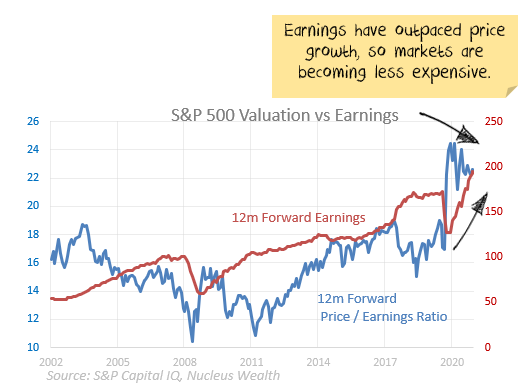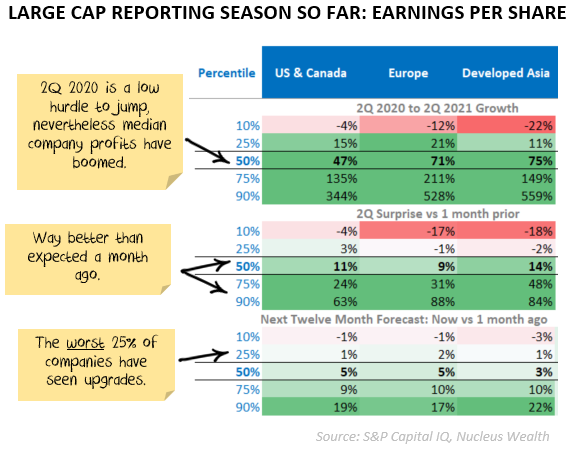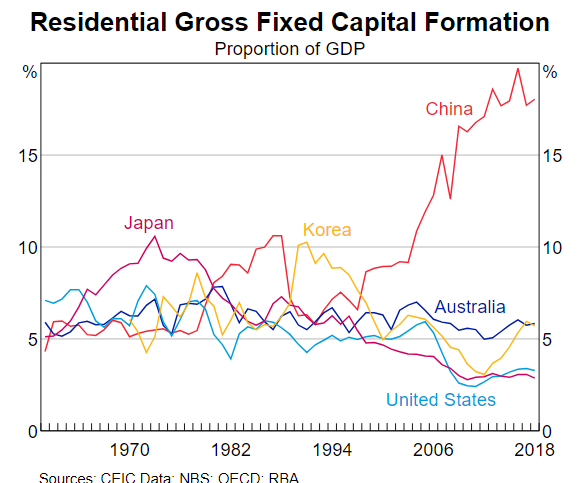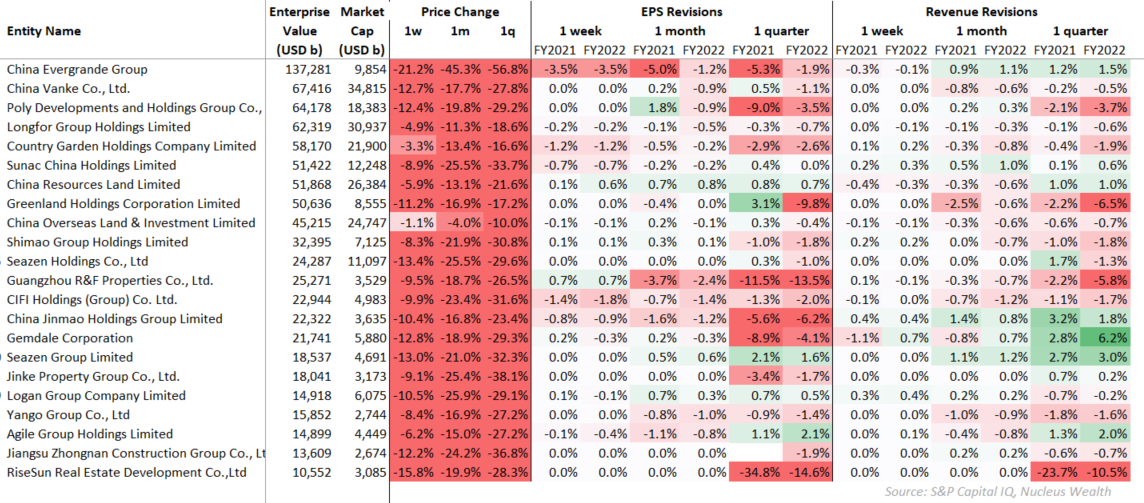Is a growth shock coming?
Stock markets are expensive. Debt levels are extremely high. But earnings growth is strong. Really strong. And government/central bank support continues. Making asset allocation tricky.
Markets are supported to a great degree by central banks and governments. Policy error is every investor’s number one risk. The danger right now is that the growth hand-off from the direct-to-consumer government stimulus of the past year to reopening economies/infrastructure is not smooth.
We have two main scenarios:
- Stock markets grind higher on the back of improving earnings and fiscal support.
- A growth “hole” emerges and markets fall until more support is provided.
Scenario 1: Stockmarkets grind higher
There are two ways to fix overpriced stockmarkets: prices fall, or earnings rise. So far, it has been the latter:

Could earnings continue to rise on the back of:
- Supply chain bottlenecks clearing and input prices falling.
- Continued productivity gains from business changes brought on by lockdowns (less staff, more automation, more work from home, lower commercial rents).
- Continued low wage growth.
- Government support.
- Reopening demand.
Absolutely. The second quarter earnings season shows how:

If you avoid equities, your key risk is that earnings boom by more than expected. By my numbers:
- the median global stock P/E is about 15% above both its 10 and 25-year averages.
- it more like 20% in the US and on a cashflow basis.
- it gets worse the more expensive you go – i.e. the 25th percentile (expensive) of stocks is about 25% more expensive than average, but the 75th (cheap) is only 5% more expensive than average. The 90th percentile is actually cheaper than average.
- could earnings be 15% better than expectations based on government support and pandemic-led productivity gains? Quite possibly. That would put median valuations back to their 10/25 year averages.
The danger of being out of the market is that government support remains high, bond yields low, inequality remains high. There is a surplus of investment over consumption, and so valuations bounce between being (say) 5% and 25% more expensive than in the past. If we are trapped in this scenario for the next decade, then markets might continue to grind higher and more conservative investors might never get a signal to invest.
Scenario 2: Stockmarket downside
The bigger risk for markets is a growth “hole” emerging. There are two sources of this: China and the US.
China Growth
Chinese growth is a major consideration. Debt growth has slowed considerably, and a broad range of measures are rolling over. Effectively China is using the strength in the manufacturing sector to rebalance its economy away from its unsustainable reliance on property development. Residential investment in China as a proportion of GDP is double the level of Japan before its housing crash, and three times higher than the US before its housing crash:

If we are right that the manufacturing boom is a short-lived inventory supercycle rather than a long term structural change, then this support will disappear. Chinese developers are pricing disaster:

The largest developer, Evergrande now has 14x more debt than equity. Evergrande’s bonds are priced for default.
There is a reasonable risk case that current conditions morph into a 2015-style Chinese slowdown which saw commodity prices tumble 50%+ and share prices down 10-15%. See our China Problem post for the full background.
US Growth
US growth faces a different problem. The direct-to-consumer stimulus has largely finished. The next stage of growth is from infrastructure stimulus, which is six months away at least. Could there be a “growth gap” between the two programs that cause the US economy to slow?
It is not the base case, but it is clearly a significant risk.
Cavalry to the rescue?
- There is every possibility that the Chinese government will stamp the debt accelerator if growth slows too much and restart the cycle. But there will be a lag.
- An “end of cycle” event seems to be a low probability at this point – central banks and governments are all-in on preventing the worst outcomes.
- However, a pullback in stock markets of 10-15% is a reasonably likely risk case; a warning shot to get central banks and governments to act.
As I have said many times, and will no doubt continue to say:
We are not in a normal market. We are reliant on government and central bank support. Policy error remains the number one risk.
Not an existing Livewire subscriber?
If you're not an existing Livewire subscriber you can sign up to get free access to investment ideas and strategies from Australia's leading investors. And you can follow my profile to stay up to date with other wires as they're published – don't forget to give them a “like”.
1 contributor mentioned

